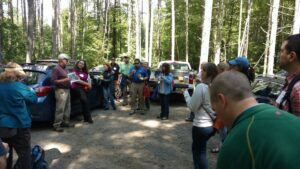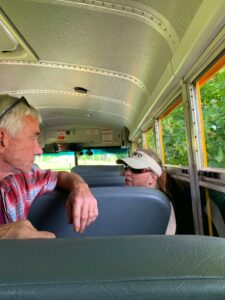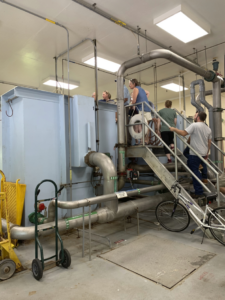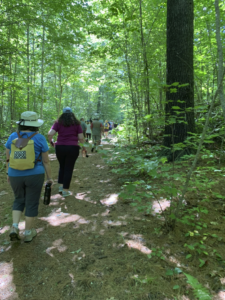
Despite challenges with the current lack of funding and heavy turnover in the past six to seven years, the Salmon Falls Watershed Collaborative (SFW) is “the little engine that could.” Their secret to success? A forward-looking attitude and focus on achievements through projects such as their Success Safari.
The SFW Collaborative does conservation work in the vulnerable Salmon Falls River Watershed of Maine and New Hampashire, which drains into the Great Bay estuary, “a coastal ecosystem of national importance.” According to the Natural Resources Conservation Service, “the Salmon Falls River is also the largest tributary to the Piscataqua-Great Bay Estuary system.” The Piscataqua Region Estuaries Partnership (PREP) estimates that the river is a source of drinking water for around 28,000 residents in Southeastern Maine and Northeastern New Hampshire.
The Start of a Tradition
While part of their work entails coordinating protection, planning, and management for water and land in the watershed, one of the collaborative’s goals, as laid out in their 2011 action plan, is also “developing and sustaining mutually beneficial partnerships to accomplish shared goals for clean water.” Annual Success Safaris are a key way in which the collaborative accomplishes this goal.
The Success Safaris were initiated in 2016 by PREP, one of the SFW Collaborative partners. “We talked about getting the partners together to do something a little bit more fun,” Abigail Lyon, Technical Assistance Program Manager at PREP, explained. Abigail and her co-workers reached out to their partners at Wells Reserve, who had experience doing field tours. Wells Reserve Training Program Director, Chris Feurt, and Training Program Coordinator, Annie Cox, then provided support for logistics and planning of a Salmon Falls Watershed Success Safari.
What resulted was essentially a field trip on a bus providing opportunities for informal networking, relationship building between partners, visits to highlight local businesses and organizations, and education on the local watershed.

Since the first safari, the collaborative has continued to develop the program. Now, on each safari, they try to highlight a protection project, a municipal project, a water source, and a business. This year’s agenda for the 4th Annual Success Safari included a discussion of forestry practices at Branch Hill Farm; a tour of the Berwick Water Department; lunch at the Teatotaller cafe with a presentation by the owner on the importance of clean water for local businesses; a walking tour of Somersworth and discussion of the city’s current water protection projects; and a visit to the Corner Point Brewing Company including a discussion of the importance of clean water for breweries.
“It’s kind of our hope that [the safari] sparks some inspiration among the partners whether it’s a project that they want to work together on that they heard a little about at the safari or an informal conversation kind of jogs someone’s memory about a potential opportunity,” Abigail explained. It’s an “opportunity to inject a little life into the collaborative each summer.”
At this year’s Safari on Cynthia Wyatt’s family property, Branch Hill Farm, the group walked the trails, as well. Ms. Wyatt is on the board of one of the SFW Collaborative’s land conservation partners, Moose Mountains Regional Greenways. Abigail excitedly explained that the public trails are named after Ms. Wyatt’s grandchildren, “She sees value for the land not just for wildlife habitat and selective cutting… but that there’s this real, strong connection to her family. And that property protected in perpetuity and the signs for the different trails that bear her grandchildren’s names–those will be there so long as they’re maintained.”
Kira Jacobs, EPA Drinking Water Program Coordinator and SFW Collaborative partner, highlighted the potential for this event to overcome state boundaries in land protection, as well, explaining the importance of cross-pollinating land conservation successes as well as opportunities to collaborate on messaging.
The safari is also meant to foster more awareness and engagement from locals. “Oftentimes residents don’t know where their water comes from,” says Kira. The Success Safari has the potential to educate and inspire community members to take an interest in protecting their drinking water source.
The Success Safari has drawn in other valued voices in watershed protection as well. “We’ve had really great participation from the wastewater treatment facilities and drinking water facilities,” Abigail reports, “and that’s an audience that we sometimes struggle to reach.” This past year, they had both presenters and participants from wastewater and drinking water facilities. “They see value in meeting with partners in the region and hearing about projects that have been successful.”
Abigail named some of the challenges with the safari, as well. Namely, as they’ve visited many locations, the question may soon become: where do they go next? One solution might be to highlight more community projects. However, if they grow their audience or want to get new members of their partner organizations up to speed, there may be some locations that would be repeated for newcomers on future trips, as well.
Pictured on left: Berwick Water Department, 2019 Salmon Falls Success Safari, photo courtesy of Salmon Falls Watershed Collaborative

What if your RCP wants to Start a Success Safari?
The Salmon Falls Watershed Annual Success Safari breathes life into the SFW Collaborative and builds partnerships with local communities, businesses, municipalities, as well as within the collaborative. Interested in initiating your own version of a success safari?
If you’re thinking these safaris sounds great but you’re not sure your RCP has the capacity to pull them off, don’t be dissuaded! The SFW Collaborative faces significant challenges of their own, not unlike those of other RCPs. While they have many successes to celebrate, and certainly put an emphasis on those achievements, Abigail reflects that “It can be challenging at times to kind of keep stoking the fire, so to speak, for the collaborative. And, oftentimes, there’s a lot of excitement when there’s a specific project or grant funding available or a property that we want to conserve. And then, because we all have roles and responsibilities in our own organizations individually, it can be challenging to continue to participate.” That’s where events like the safari can come in to help.
So, how do the lessons from the Success Safari translate to other RCPs interested in holding similar events? Abigail Lyons and Kira Jacobs have some advice.
“I think the most important thing is to keep it really fun,” Abigail says, “The whole point is to make it something people want to continue to attend.”
Another tip, which may be familiar to those who attended the RCP Network Gathering workshop on engaging municipalities, is meeting people where they are both literally and figuratively. Abigail sees having some form of evaluation as key to this. “We’ve been able to kind of tweak and change what we’ve done based off of how people felt about previous [safaris].”
Kira argues that holding the event in the summer has been strategically successful as well, “‘A.’ the weather is great, and ‘B.’ it feels like summer camp,” which works in favor of increasing the ‘fun factor’ of the event. Kira has also observed that fewer meetings are scheduled in July and August, making those months a potentially good time to schedule a fun event.

The bus itself has also proved to be important to the success of the event over the years. For reasons such as cost (including insurance for both sides of state lines), the partnership stopped using the bus for a period of time. PREP, feeling that the bus was important, sponsored it for this year’s safari. Abigail explained that “carpooling is one way to do it but being able to all be together is really important if that’s feasible.” In terms of transportation, having a walking tour piece to change up the pace of driving from location to location has also worked well for the collaborative.
In 2017, the safari went to the Keay Brook Preserve. “It’s right on the river, and it’s stunningly beautiful. We had a lovely walk through the woods… and we had this really nice picnic,” Kira recalls. “You have a different conversation professionally when you’re walking through the woods than you do in a conference room. It changes the dynamic.”
For more information, please contact Abby Lyon or Kira Jacobs.
